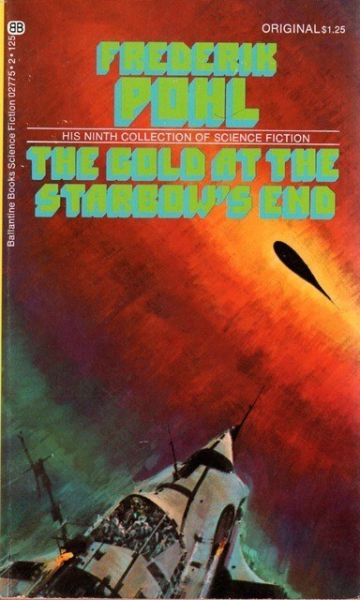Gateway to Adventure
The Gold at the Starbow’s End
By Frederik Pohl

31 Dec, 2023
Frederik Pohl’s 1972 The Gold at the Starbow's End is a collection of short science fiction stories.
Several are cautionary tales, that being one of Pohl’s fortes. At least one is a cautionary tale for hard-SF authors.
In this collection Pohl demonstrates his ability to shape stories to specific markets, a skill that is widely held to be a key to selling fiction. The Analog tale is hard SF with numerous science flubs; the two F&SFs are both slight horror stories; Worlds of Fantasy is a dark comedy; and If is a dystopian hard SF story.
The collection has aged reasonably well. At least to my taste. That is not always the way to bet with collections of this vintage.
The Gold at the Starbow's End is available here (Amazon US), here (Amazon Canada), and here (Amazon UK). The Gold at the Starbow's End is not listed at Apple Books, Barnes & Noble, Chapters-Indigo, or Kobo. ISFDB doesn’t list any editions after 1975, which makes me wonder about the legality of that Amazon Kindle edition. I would have checked Pohl’s website The Way the Future Blogs, but it seems to have vanished in 2019.
More details below.
The Gold at the Starbow's End • (1972) • novella
At the urging of Dr. Dieter von Knefhausen, the United States of America launched the starship Constitution towards Alpha Centauri’s habitable world Alpha Aleph. Once again, America is going to show the world what’s what!
Ostensibly, the mission is the first step towards colonizing Alpha Aleph. This is a lie. Knefhausen’s true purpose was to isolate a crew of geniuses so that they could provide America with the next paradigm shift. Alpha Aleph does not exist. Constitution and all aboard it are on a one-way mission to certain death. But as the increasingly unfortunate Knefhausen discovers, that certain death is not the crew’s.
Dr. Dieter von Knefhausen is a very thinly disguised Henry Kissinger, one who has never heard the saying “be careful what you wish for.”
The good news from Pohl’s perspective is that this story won its Locus category, and was both a Hugo and a Nebula finalist. The bad news is that having heaped accolades on the tale, readers then proceeded to pick apart essentially every detail of the hard science and mathematics featured in the narrative, up to and including the title’s starbow, a beautiful idea dependent on an incorrect assumption about stellar spectra. Oh, well1.
Despite barely having enough content for a novella, this tale was later expanded into the novel Starburst, thus delivering to readers the narrative equivalent of an aerogel.
“Sad Solarian Screenwriter Sam” • (1972) • short story
A stereotypical Hollywood writer tries to use the recent discovery of intelligent Martians as the springboard for a John Carter of Mars movie, a venture which founders on the vast gulf between Burroughs’ Martians and reality. Unbeknownst to humanity, Sam’s work is the litmus test by which humanity will be judged by the all-powerful aliens, which is just too bad for us.
It’s obvious early on that Sam is going to doom us all by failing the test … but of course there’s a twist.
This was later included in the 1988 collection The Day The Martians Came, whose theme I bet you can guess.
“Call Me Million” • (1970) • short story
An unassuming man discovers first a monstrous gift, then the concept of limits to growth.
Shaffery Among the Immortals • (1972) • short story by Frederik Pohl
A self-proclaimed genius is repeatedly stymied by the fact that his desire to be the next Einstein is hopeless if he doesn’t have the actual brilliance. In the end, however, he earns the fame he so desperately craves. Or perhaps infamy is a better word.
It was surprising to see this in a 1972 story: “There was Hoyle, still making a good thing out of the Steady State Hypothesis.” But this is Shaffery and he’s an idiot. The world has too many sad Shafferys, convinced that they are geniuses denied their rightful recognition.
The Merchants of Venus • [Heechee] • (1972) • novella
Audee Walthers left behind a life of moderate prosperity on Earth for a life of adventure searching for alien relics on hostile Venus. This may have been a mistake. The minimum income needed to sustain life on Venus is much higher than it is on Earth and the Venusian economy is rudimentary at best. Life is a hand to mouth affair, particularly for Audee, who desperately needs a liver transplant.
Salvation arrives in the form of billionaire tourist Boyce Cochenour. Boyce will pay Audee the million dollars he needs for a new liver if Audee will guide Boyce to promising archeological sites. Even if Audee can find such a site for Boyce, can Audee depend on the ruthless Terran to pay?
While the Venus in this tale is clearly post-Mariner 2 Venus, or at least not a Classic Venus, Pohl seriously understates how hostile Venus actually is. Pohl’s Venus has a 20,000 millibar, 270o C atmosphere. The actual figures are closer to 93,000 millibars and 460o C. Did he get it wrong, fudge the numbers to make the story work, or did science simply move on?
Pohl expanded the setting but not this story itself in his 1977 novel Gateway. That is a better approach than simply inflating a novella. Gateway is that rare bird, a sequel better than the original. Gateway’s sequels, alas, are not.
1: My contribution to the torrent of criticism is to point out that the mass ratio of the Constitution must have been horrendous, given that the ship reaches Alpha Centauri in just a decade and that hydrogen fusion isn’t developed until part way through the story … by the crew of the Constitution.
